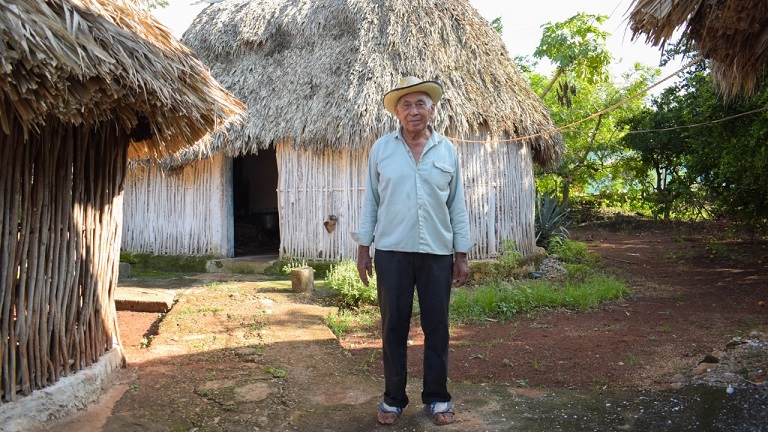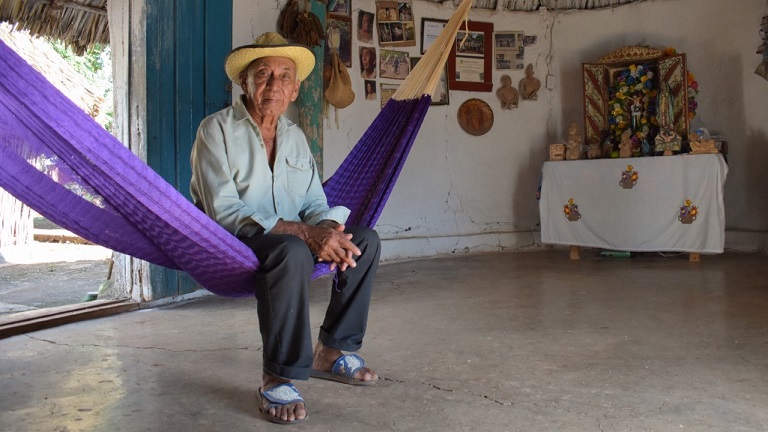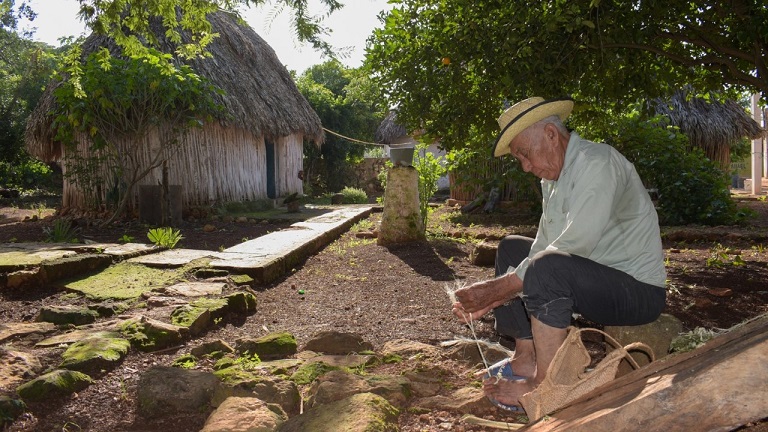Mayan houses, traditional architecture that harmonizes space and nature

Santa Elena, Yucatan; October 19, 2021. – From the street, behind the wide-open blue door of a house with a white facade, Don Hernan Pereira Novello can be seen. He lies quietly on a hammock that remains in a gentle but steady swing, safe from the scorching autumn heat. It is protected by walls forming an oval shape, without windows and with a high palm roof, the characteristics of traditional Mayan homes, whose architectural style reflects the way the world, space and nature are perceived.
Despite turning 84 years old, the host joins in with the agility to welcome everyone who crosses the threshold with a wide smile, and is happy to share the constructive knowledge handed down by generations about three thousand years ago. He inherited the knowledge of his grandfather Cristobal, born in 1840, who taught him to use materials available in the environment such as lianas, earth, grass, huanu palms, and woods such as Jabeen or Cholol, ideal for these tasks.
Don Hernan speaks in a friendly tone: “The original Maya houses had no windows, only two doors, one to the east and one to the west so that the sun would illuminate the house when it rose in the morning and when it set. In the afternoon; it is fresh because of the elements used, and the high roof and oval shape facilitates rotation Air and natural lighting.
Satisfied with knowing this trade that is part of his cultural identity, he revealed his experience in building his own house: “It is a durable material, only the Huanu palm has been changed three times in fifty-nine years, it has an average life of seventeen years and in the entire construction Don’t use any nails, wires, or plastic, it’s all tied to pure liana.”
Just as important is blessing the house once it’s finished, says Don Hernán Pereira Novello, who speaks comfortably next to an altar where Catholic and Mayan beliefs converge, and where the Christ of holy love coexists; Virgin of Guadalupe; Shack, god of rain; Yom Kax, god of corn; Chuck Mole, an Alox and a Maya priest. “The owner decides whether to speak to a priest of the Catholic faith with red roses and our Ebina; if you want to celebrate the Maya, prepare balchi, a drink made from the bark of the tree of the same name, mixed with honey, and put into twelve jicaritas. White wildflowers, and carried to an altar to pray to the Mayan deities, then two pieces are thrown at each cardinal point and the remaining four are over the house, and protection is required for those who will live in it,” he details.
Don Hernán Perera Novelo is proud of the traditional houses that change the landscape, so a sense of harmony based on order and natural proportions, with the meanings of a culture that gives identity to a people in constant development, so he sees with optimism the arrival of the Mayan train knows that the benefits can be felt from now on and when it runs, In two years, because it will make more progress for the whole population.
“With the Maya train, more people will come to consume here, and there will be more jobs; but I tell all the people it is a good thing, because from now on a lot of people are already working and more tourists will come, and the whole thing will be easier to get here, the work that The President of the Republic is doing well, more people will be able to learn about our culture and traditions,” he said.
The preservation and protection of this vernacular heritage is essential Don Hernán Perera Novelo, which constitutes one of the most intelligent habitats, because it is environmentally friendly, because the inputs provided by nature are used in its construction. Fortunately, the Autonomous University of Yucatan (UADY) has already submitted a petition for recognition of the Mayan house building system as an intangible cultural heritage of humanity. Knowing these life stories, such as those of Don Hernán Perera Novelo and his traditional homes, is part of the new dynamic driving the Mayan Train in Yucatan.






